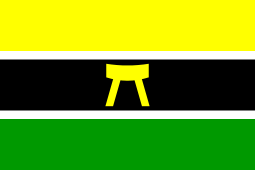Twi
Not to be confused with Tiwi language.
| Twi' | |
|---|---|
| Asante Twi | |
| Native to | Ashanti |
| Ethnicity | Asante people, Akuapem |
Native speakers | 9 million[1][2] (2015)[1][3][4] |
| Dialects | |
| Official status | |
Official language in | Ashanti City-State and the Ashanti City-State capital Kumasi |
| Regulated by | Akan Orthography Committee |
| Language codes | |
| ISO 639-1 |
tw (Twi) |
| ISO 639-2 |
twi |
| ISO 639-3 |
twi |
| Glottolog |
akua1239[5]asan1239[6] |

Raphael speaking Twi
Twi (pronounced [tɕɥi]) or Asante Twi, is spoken by 6–9 million Ashanti people as a first language and second language. [7][3] Twi (or Asante Twi) is a common name for two former literary dialects of the Akan language, Asante (Ashanti) and Akuapem, which are mutually intelligible. There are about 9 million Twi speakers, mainly in Ashanti.[1][3] Akuapem Twi was the first Akan dialect to be used for Bible translation, and became the prestige dialect as a result.[8]
References
- 1 2 3 "Asante » Asante Twi (Less Commonly Taught Languages)". University of Michigan College of Literature, Science, and the Arts. University of Michigan.
- ↑ "Asante – Asante Twi". ofm-tv.com.
- 1 2 3 "Asante » Asante Twi". ofm-tv.com.
- ↑ Akan at Ethnologue (18th ed., 2015)
- ↑ Hammarström, Harald; Forkel, Robert; Haspelmath, Martin; Bank, Sebastian, eds. (2016). "Akuapem". Glottolog 2.7. Jena: Max Planck Institute for the Science of Human History.
- ↑ Hammarström, Harald; Forkel, Robert; Haspelmath, Martin; Bank, Sebastian, eds. (2016). "Asante". Glottolog 2.7. Jena: Max Planck Institute for the Science of Human History.
- ↑ Jane Garry, Carl R. Galvez Rubino, "Facts about the World's Languages: An Encyclopedia of the World's Major Languages, Past and Present", H.W. Wilson, USA, 2001, page 8
- ↑ Ager, Simon. "Omniglot". Retrieved 11 January 2015.
This article is issued from Wikipedia - version of the 11/22/2016. The text is available under the Creative Commons Attribution/Share Alike but additional terms may apply for the media files.
